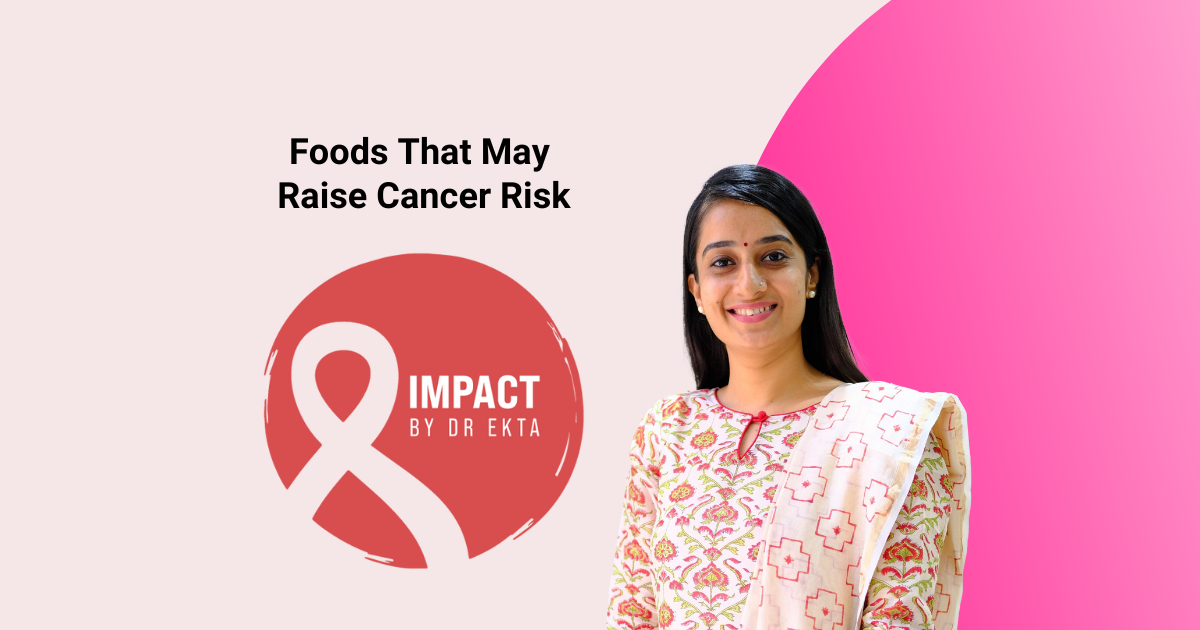What you eat plays a major role in your health and can affect your cancer risk. While no single food guarantees disease, certain dietary patterns and items may increase the likelihood of developing cancer over time. This guide explains which foods have been linked to higher risk, why they matter, and how small changes can support a healthier future.
Why Diet Matters in Cancer Prevention
- Cancer arises from DNA damage that accumulates over time—certain foods contain compounds that promote this damage.
- Research estimates that up to one‑third of cancers could be prevented by a healthier diet, along with other lifestyle improvements
- Consistent, long-term dietary habits—rather than occasional indulgences—have the greatest influence on overall risk.
Processed Meats
- Why they matter: Classified as Group 1 carcinogens by WHO/IARC—evidence confirms processed meat causes colorectal cancer, with likely links to stomach cancer
- How big the effect? Eating 50 g daily (a few slices of bacon) raises colorectal cancer risk by about 18%
- Reason: Nitrates, nitrites, and nitrosamines (formed during curing or smoking) can damage DNA
- Tip: Limit intake to occasional use; choose untreated deli meats, or better yet, plant-based alternatives.
Red Meat (Beef, Pork, Lamb)
- Cancer link: Classified as Group 2A “probable” carcinogen; strongest evidence links it to colorectal risk, with possible links to prostate and pancreatic tumours.
- Risks: High-heat cooking forms HCAs and PAHs, known carcinogens
- Data: Each 100 g cooked daily could raise colorectal cancer risk ~17%
- Tip: Swap red meat for lean poultry, fish, legumes, or low-mercury fish; grill at lower heat.
Overcooked or Charring of Meat
- Cooking at high heat (frying, grilling, barbecuing) produces heterocyclic amines (HCAs) and polycyclic aromatic hydrocarbons (PAHs).
- These chemicals can damage DNA and are linked to higher prostate, colorectal, pancreatic, lung, esophageal, and stomach cancer risk .
- Tip: Boil, steam, or bake instead; if grilling, marinate first and avoid charring—flip often.
Ultra-Processed Foods & Sugary Drinks
- High in refined carbs, unhealthy fats, additives, and salt; low in nutrients and fiber.
- Promote obesity, metabolic imbalance, and inflammation—all recognised cancer risk factors .
- Linked to increased risk of GI, breast, esophageal, and head/neck cancers .
- Tip: Choose whole grains, fruits, veggies, nuts, seeds; drink water, herbal tea, or unsweetened beverages.
Alcohol
- Metabolises to acetaldehyde, a known carcinogen, altering hormone levels and interfering with nutrient absorption
- Associated with breast, colorectal, liver, esophageal, and stomach cancer
- Risk: Even moderate consumption (1 drink/day) increases risk.
- Tip: Skip alcohol when possible, or limit to 1 drink for women and 2 for men, per occasion.
Added Sugar & Refined Carbs
- Promote overweight, insulin resistance, inflammation—all associated with higher breast, endometrial, and colorectal cancer risk.
- Sugary foods often coincide with poor nutrition, compounding risk factors.
- Tip: Eat minimally processed foods; choose whole fruits over juice or sweets; pick whole grains.
Dairy & High-Fat Animal Foods
- Some evidence links high dairy intake (milk, cheese) to slightly higher prostate cancer risk through IGF-1 pathways .
- Evidence not conclusive; benefits often outweigh risks if consumed moderately.
- Tip: Opt for low-fat or fermented options; balance with plant-based proteins.
Minimizing Toxin Formation
- Marinating meats with acidic and antioxidant ingredients (lemon, vinegar, spices) can reduce HCA formation
- Avoid open flame, slow cook over indirect heat; flip meat frequently .
- Grill fruits, vegetables, or lean fish instead.
How to Make Foods That May Raise Cancer Risk Safer
- Switch meat types: Use poultry or fish instead of red/processed meat; aim for a plant-forward diet.
- Reduce heat: Steaming, boiling, roasting are safer than frying or grilling high heat.
- Choose quality processed meats: Pick nitrate-free and low-sodium when possible.
- Cut sugar: Drink water, eat whole fruits; limit sweets and sugar-sweetened beverages.
- Limit alcohol: Better to skip, less is safer.
FAQ: Diet and Cancer Risk
Q: Is occasional processed meat dangerous?
A: Risk comes from long-term patterns. Occasional intake is fine within a balanced diet.
Q: Will avoiding red meat eliminate cancer risk?
A: Not entirely, diet is one of many factors. But it significantly lowers colorectal and possibly prostate risk.
Q: Are plant-based meats safe?
A: Choose minimally processed plant proteins. Check labels—avoid highly processed forms.
Q: Does charred food always cause cancer?
A: Avoiding charred bits reduces exposure to HCAs and PAHs, lowering risk indirectly.
References
- MD Anderson: Foods Linked to Cancer mdanderson.org
- Healthline & Verywell Health: Carcinogenic Foods Summary
- Cancer Council & McGill: Meat & Colorectal Cancer Stats

